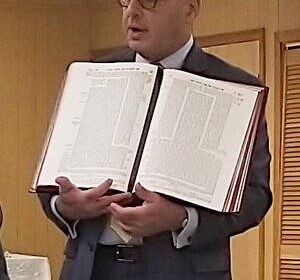
Chairman of Israel Cancer Research Fund shares his story of hope and survival
By Stacey Dresner
GREENWICH – Tamir Gilat, chairman of the Israel Cancer Research Fund (ICRF), will share his personal story of cancer survival at the ICRF Greenwich chapter’s Second Annual Heroes for Hope on Sunday, Oct. 15, 6 p.m. at Temple Shalom.
A former goalkeeper for the Maccabi Tel Aviv professional soccer team, Gilat is an attorney and businessman who dedicates much of his time raising funds for cancer research in Israel. He has good reason: Both Gilat and his wife Keren were struck with cancer. Keren died from breast cancer three months ago; Tamir underwent surgery immediately following his diagnosis. A few months later, another form of cancer was found in his body and again he was told that his days were numbered.
Gilat agreed to participate in an experiment conducted on a few hundred patients around the world, headed by Prof. Bella Kaufman of the Sheba Medical Center and Dr. Talia Golan. He is the only patient in the study with his type of cancer who remains alive today. Gilat attributes his survival to the life-saving or life-extending drugs, the doctors and mental fortitude.
Hosted by Rabbi Mark S. Golub, the 2017 Heroes for Hope event will honor the late Ben Zinbarg and Joan Zinbarg Hochberg.
Ben Zinbarg was a board member and past president of the United Jewish Federation of Greater Stamford, New Canaan and Darien and later served on the national board. He was the founding president of the Jewish Community Endowment Foundation, a member of the board of the Bi-Cultural Day School and the Open University, the online university of Israel.
Joan Zinbarg Hochberg served as women’s division president of the Jewish Federation of Greater Stamford. She was also involved in the JCC of Stamford Center Women and the Chai Group of Hadassah. Together, the couple initiated the Zinbarg Camp Scholarship Fund at Jewish Family Services.
Tamir Gilat recently spoke with the Jewish Ledger about his battle with cancer and about the important cancer research being done in Israel through the funding of IRCF.
JEWISH LEDGER (JL): Tell us about your cancer diagnosis and your cancer treatment.
TAMIR GILAT (TG): I was diagnosed Feb. 8, 2011 with two different cancers. I had a whipple procedure (a major surgical operation involving the removal of the head of the pancreas, the duodenum, the proximal jenunum, gallbladder, and part of the stomach), and also had my left kidney removed.
The follow-up treatment was 12 chemotherapy treatments. After the 11th treatment, I felt something was wrong and called my doctor to tell her, “I feel my cancer is back.” The doctor said it was impossible. Tests were done and indeed the cancer was back. The doctor then told me “There are no more treatments. You only have a few months to live.”
JL: How did you come to learn about the experimental treatment at Sheba Medical Center?
TG: The next week, my doctor, Dr. Talia Golan, medical director of the Pancreatic Center at Sheba Medical Center who is dedicated to advancing pancreatic cancer research, called to tell me about an experimental treatment with Sheba Medical Center and Houston’s M.D. Anderson Cancer Center. Dr. Bella Kaufman of Sheba Medical Center was head of the trial. The purpose of the study was to extend by a few months the life expectancy of cancer patients with breast, ovarian, or pancreatic metastasis and the BRCA gene. The 14-month treatment was a pill, a PARP inhibitor from the family of Olaparib.
JL: Most other patients who were a part of the experimental treatment survey died, but you have survived. Why do you think this is so?
TG: A mix of reasons kept me alive. I was treated at Sheba – a great medical center; I had an amazing doctor, and my body responded very well to the experimental drug. Let’s not forget I was also lucky… and gifted with the ability to remain optimistic in each situation thanks to my mental fortitude.
JL: How did you hear about the Israel Cancer Research Fund?
TG: I was introduced to the Israel Cancer Research Fund by my late wife who attended an ICRF parlor event few months after I was diagnosed. We decided to host an ICRF event at our home and 80-100 people attended. It was the fall of 2011. When I heard the lecture of Dr. Gal Merkel from Sheba Medical Center – the youngest and one of the most promising scientists of Israel and an ICRF awardee – I fell in love with the ICRF. I was thrilled by ICRF’s brilliant young scientists who are working tirelessly to find a cure for this dreaded disease.
JL: Why is the ICRF so important?
TG: ICRF is very important for Israel and for cancer research globally. Our talented scientists think outside of the box. They are constantly looking for new treatments and solutions to extend life. In addition, the research conducted in Israel is less expensive than the U.S. and Europe. ICRF provides incentive for its world-class scientists to remain in Israel, preventing the brain drain. With the 2017/18 grants, ICRF has now funded 21,348 grants totaling $63,866,500.
JL: Do you believe a cure for cancer will come from the minds and research of Israeli researchers?
TG: I have every reason to believe that the cure for cancer may likely come from the research of Israeli scientists. ICRF already exists for 40-plus years and in that time we have seen many breakthroughs that have extended the lives of many cancer patients around the world. ICRF-funded research has helped lead to the development of life-saving drugs such as Gleevec, Doxil and Velcade, the discovery of the p53 tumor gene and the identification the Philadelphia Chromosome, the first abnormal chromosome found in leukemia. Israeli scientists took part in the research leading to the development of the immunotherapy drug that I am currently on.
JL: What specifically are the funds raised by ICRF used for?
TG: Currently ICRF is using its funds for studies in bone, brain, breast, colorectal, head and pancreatic, pediatric, prostate and skin cancers, anticancer drug mechanisms, drug resistance, and target therapy, and a host of other areas of cancer research studies.
JL: What are some of the promising treatments for breast cancer that researchers are working on in Israel?
TG: There have been many significant breakthroughs in breast cancer research over the years. For example, Professor Ephrat Levy-Lahad is collaborating on a long-term project with the University of Washington’s Dr. Mary-Claire King — the breast cancer research pioneer who discovered the BCRA-1 gene mutation that causes cancer — on a genome sequencing study of Israeli women with inherited breast and ovarian cancer genes. The two women are using a grant from the Israel Cancer Research Fund to apply genomic technology to study BRCA-1 and BRCA-2 mutations and their implications for breast cancer risk in non-Ashkenazi women in Israel, who are similar to populations in Europe and the United States. In a project that is testing thousands of women for deadly cancer mutations, they are also studying how mutations in genes other than BRCA-1 and BRCA-2 impact inherited breast cancer in non-Ashkenazi Jews.
JL: How are you doing now?
TG: In 2015, I had another operation. I started immunotherapy and I am still in treatment every two weeks. I am focusing on how to live with cancer and not fight cancer. I am recovering from the death of my beloved wife, Keren, from breast cancer, three months ago. I am holding the family together – I have two young daughters. There is a lot of pain but also optimism and belief in the future. I am not angry. This is life and we need to learn how to deal with the challenges that life presents. There is no conspiracy against people who get sick. I am grateful that through experimental drugs we were able to prolong my wife’s life for another two years.
JL: How would you say cancer has changed you?
TG: How has cancer changed me? It turned my life upside down! As a result of my cancer I had to quit my career in international business and law. I have learned to live day by day. I also learned how to feel gratitude for what I have, and to appreciate the basic things in life. I feel for the first time I am totally content with what I have in my life right now.
For more information, contact David Kweskin, Connecticut-area director of ICRF at (203) 321-1006, or David.Kweskin@icrfonline.org.








 Southern New England Jewish Ledger
Southern New England Jewish Ledger













